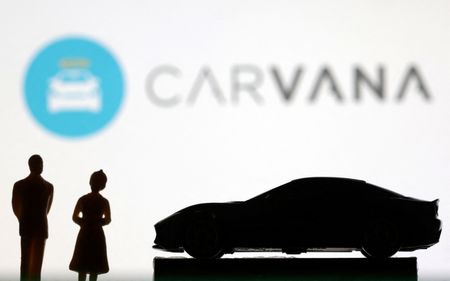By Nathan Gomes and Sinéad Carew
(Reuters) -Shares of used-car retailer Carvana Co closed up 56.0% on Thursday with some help from traders covering their bearish bets after the company forecast second-quarter adjusted earnings above Wall Street expectations due to cost-cutting initiatives.
During the session Carvana shares rose as much as 68% to $26.09, which was a more than eight-month high for the stock. The shares last traded at $24.23 with more than 173 million shares changing hands for a record high trading volume.
Debt-laden Carvana said it expects to report second-quarter adjusted earnings before interest tax, depreciation and amortization (EBITDA) above $50 million. In May it had forecast a quarterly profit, but did not provide numbers until Thursday.
This EBITDA forecast exceeded consensus expectations for a loss of $6 million according to Stephens analyst Daniel Imbro, who had estimated EBITDA of $1.0 million-plus.
The Tempe, Arizona-based company said non-GAAP total gross profit per unit (GPU) would be above $6,000, a record for the company and an improvement of 63% from the year-ago quarter.
While sell-side analysts were impressed with the numbers, Thursday’s move also led to a short squeeze, which occurs when many investors bet that a stock will decline but they have to rush to cover their bets when its price rallies instead.
“The short squeeze definitely helped but it wasn’t the primary driver of the price move, which was really due to long buying because there were so many shares traded” said Ihor Dusaniwsky, head of predictive analytics at markets data provider S3 Partners. He estimated that about 47 million Carvana shares were sold short ahead of the company’s forecast.
By the Thursday’s close, Carvana short-sellers were down over $1 billion year-to-date compared with their $596 million year-to-date market losses on Wednesday, Dusaniwsky said.
Short sellers make bearish bets by borrowing securities for a fee and immediately selling them with an aim to repurchase them at a lower price in the future, then return them to the lender and pocket the difference.
Carvana has been trimming inventory and slashing advertising expenses to help move closer to profitability and attain positive free cash flow.
“We are impressed with Carvana’s ability to improve its non-GAAP operating metrics as the shift to profitability, while sacrificing growth, has realized benefits faster than we anticipated,” wrote Stephens’ Imbro.
Carvana had ended 2022 at $4.74. But even with Thursday’s rally it was still far below its 2021 peak of $376.83.
(Reporting by Nathan Gomes in Bengaluru and Sinéad Carew in New YorkEditing by Lance Tupper, Matthew Lewis and Diane Craft)

